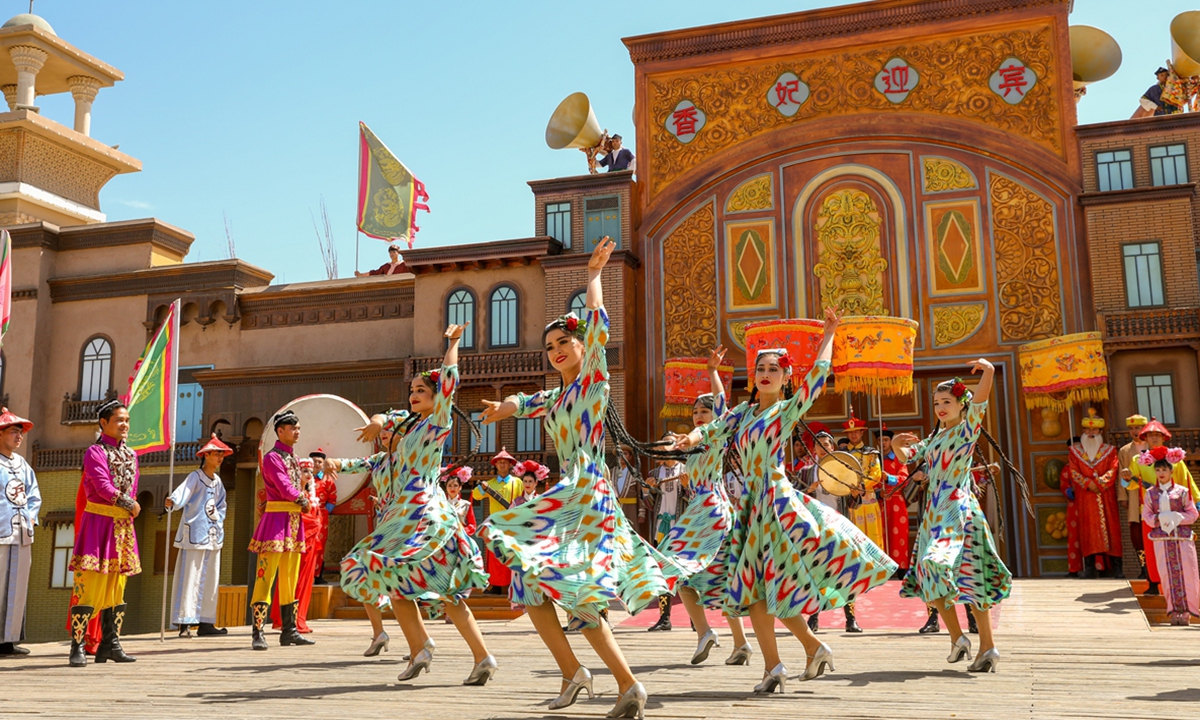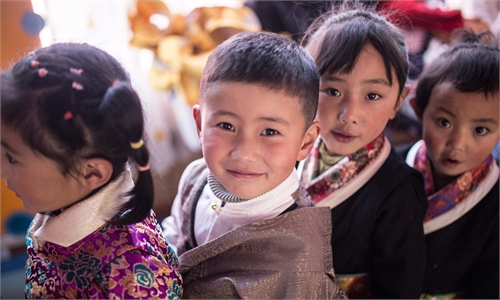
Xinjiang Photo: VCG
Editor's Note:
The United Nations Human Rights Council began the 45th session of the Working Group on the Universal Periodic Review in Geneva, Switzerland, this week. On Wednesday, several Chinese scholars discussed the issue of Chinese modernization and human rights protection during a side event of the session organized by the China Society for Human Rights Studies. We have excerpted the opinions of three experts from their remarks to demonstrate the progress of China's human rights at all levels.
Remina Xiaokaiti, associate professor at Xinjiang University
Human rights in Xinjiang have made tremendous progress in the cause of Chinese modernization. The unprecedented achievements in the economic and social growth of Xinjiang have led to the enhancement of individuals' livelihoods with the feeling of accomplishment, happiness and security of all ethnic groups.
Since 2012, Xinjiang has vigorously implemented employment projects to benefit the people, continuously increased vocational training, actively broadened employment channels and effectively expanded employment capacity. The employment situation has continued to improve, the income level of all ethnic groups rising and the quality of life has seen an improvement too.
For example, it focuses on the implementation of a local employment policy for surplus rural labor, establishing rural satellite factories and poverty-alleviation workshops to absorb employment according to local conditions.
The implementation of education project has also led to the highest levels in history for preschool education, nine-year compulsory education, high school education, higher education and vocational education in Xinjiang. Furthermore, the quality of the workforce in Xinjiang has been significantly improved.
Xinjiang has made unrelenting efforts to safeguard social equity and equity and to promote the holistic growth of individuals, safeguarded the employment rights and interests of all ethnic groups in accordance with laws and the common values of the international community, and has given utmost importance to create decent livelihoods for individuals.
Xinjiang has taken a people-centered approach, supporting initiatives, such as the Decent Work Agenda of the International Labour Organization, and diligently implementing the Decent Work Country Program for China (2016-2020).
Some Western countries have been imposing sanctions on Chinese enterprises based on fabrication and speculation about the existence of "forced labor" in Xinjiang. This is a form of unilateral bullying and undermines the prosperity and stability within the region.
Various surveys, novel technologies, machinery and equipment have been introduced to the cotton growers in the southern region, resulting in the attainment of a fully automated production process across the entire process. It is noteworthy that the practice of machine picking cotton has become a prevalent practice. For instance, in the Aksu Prefecture, the cotton harvesting area by machines accounted for 71.3 percent of the total cotton cultivation area. Specialized cotton cooperatives are generally established, greatly enhancing the scale of cotton production.
Xiao Wu, associate professor at the Human Rights Research Institute of Southwest University of Political Science and Law
The top priority of the governance of Xizang (Tibet) in accordance with the law is to uphold the legislative authority of the Constitution of the People's Republic of China, adhering to the principle that all are equal before the law. Stability maintenance is strictly limited within the legal frame and practiced under the guidance of legal thinking and legal methods. The only cause of conviction and punishment is the violation of the law. There is no detention without just cause, no illegal incarceration, no freedom deprivation and persecution targeting specific ethnic groups or communities, not to mention any differentiated punishment against Xizang minorities and religious believers.
The Constitution and the Criminal Procedure Law of the People's Republic of China have explicitly specified the conditions and procedures for implementing coercive measures such as arrest and detention. We learned that law enforcement and judicial authorities at all levels in Xizang strictly adhere to legal regulations. They continuously standardize coercive measures, reduce the use of custodial coercive measures, vigorously promote the reform of the criminal justice system centered around the trial and actively improve leniency systems such as plea bargaining.
People of all ethnicities in Xizang enjoy the various rights conferred by laws to manage state and local affairs. They also widely and fully exercise their democratic rights in their daily lives, including the right to be informed, participate, express opinions, and supervise state and social affairs. All lawful demands and expressions are protected by the law, and individuals will not be punished for exercising their rights such as the right to criticize and make suggestions.
In Xizang, various religions coexist, including but not limited to Tibetan Buddhism, Bon, Catholicism and Islam. All religions and religious sects are equal, and all religious believers and non-believers are treated with equal respect and protection. Xizang has more than 1,700 sites for Tibetan Buddhist activities and over 1,700 religious and folk activities to meet the normal religious needs of religious believers.
The State law outweighs religious rules, while religious believers are first and foremost citizens. Some religious people being penalized and convicted according to the law due to their acts that violated the provisions of the law bears no relation to their religious beliefs. We found no cases in which people were arrested and convicted on the basis of religious belief.
Chang Jian, director of the Human Rights Research Center of Nankai University
The goal of Chinese modernization is not only to promote the comprehensive enrichment of things, but also to promote the comprehensive development of human beings. The realization of free and comprehensive human development is not only the fundamental goal of Chinese modernization, but also the ultimate value to be pursued in the development of China's human rights cause. China's efforts to safeguard the rights to survival, participation, freedom and equality have created the conditions for realizing the free, comprehensive and common development of all people in the process of modernization.
First, human development requires a corresponding material and economic foundation. To this end, China insists on promoting human rights through development, endeavors to increase its productive capacity, and uses the fruits of development to improve the lives of its people, constantly raising the level of protection of their right to subsistence. For example, in the area of safeguarding the right to social security, China has built the world's largest social security system, realizing that all people should be covered.
Second, comprehensive human development requires full participation in all areas of social life. To this end, China has taken steps to establish appropriate systems and adopt a variety of policy measures to provide appropriate conditions for the full participation of members of society in all spheres of life.
In the political sphere, for instance, China is actively promoting people's democracy throughout the entire process, safeguarding citizens' right to vote, to be informed, to express themselves, to participate and to supervise at all stages of the chain, including elections, consultations, decision-making, management and supervision.
Third, the free development of all human beings requires that citizens' right to all freedoms be safeguarded in accordance with the law. China has enacted a series of laws and regulations to safeguard citizens' personal freedom and security, the right to freedom of expression and the right to freedom of religious belief.
Finally, the common development of all people requires guarantees of the equal enjoyment of rights and special protection of the rights of specific groups in society that are disadvantaged. China has taken active measures to safeguard the rights of specific groups such as ethnic minorities, women, children, the elderly and persons with disabilities, to protect them any kind of discrimination, and ensure they are looked after and their needs are met.

